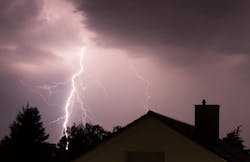Climate Change Is Driving Up Demand for Stormproof Homes
Weather emergencies such as hurricanes, tornadoes, floods, and wildfires are becoming more frequent and more destructive as climate change rapidly accelerates, according to the most recent IPCC report. As a result, homeowners are fortifying their homes with resilient and sustainable materials like stronger windows, thicker insulation, and passive solar power, while builders and architects are reevaluating traditional framing and assembly methods for greater durability in at-risk environments.
Resilient construction techniques can also be applied to preexisting structures based on the recommendations of home inspectors and energy audits, which identify areas of the home that would benefit from weatherization, The Washington Post reports.
A resilient home is one that’s built for the future after an assessment of current and predicted risks, says Illya Azaroff, a founding principal of +LAB architects and an associate professor at New York City College of Technology.
“Resilient design can have multiple benefits, including sustainability,” says Alex Wilson, president of the Resilient Design Institute and founder of BuildingGreen in Brattleboro, Vt. “The elements of resilient design, such as higher insulation levels, stronger windows, passive solar power and natural daylight that will help homeowners survive power outages, extreme heat and extreme cold, also save energy and mitigate climate change.”
